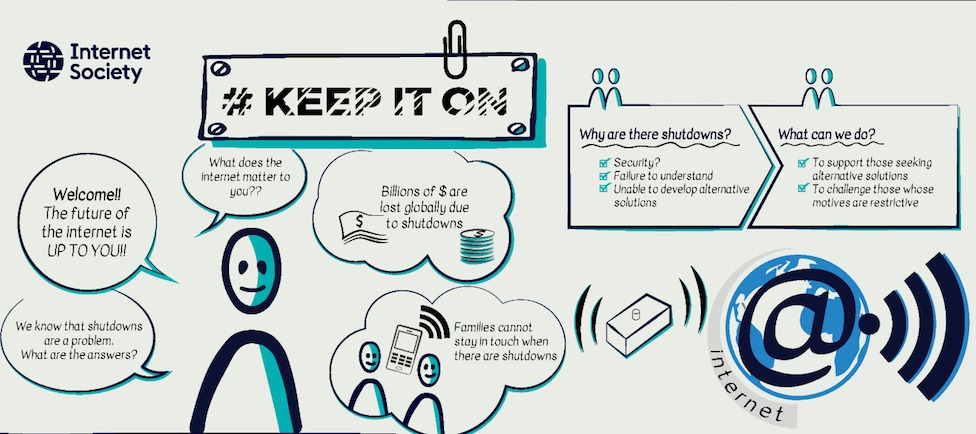Last year alone, the international digital rights advocacy organization Access Now recorded 56 Internet shutdowns worldwide. There’s concern about this growing trend and worry that governments are blocking social media and communications tools, in particular.
Many private sector and civil society organizations have condemned the shutdowns, and there have been dialogues and campaigns held around the world to try and prevent this growing trend. But while most of these dialogues are filled with decision-makers, legislators, and civil society organizations, young voices have been left out.
Many youth, who straddle the present and future, find it hard to imagine a world without the Internet. It’s how they connect with friends, family, and new audiences, and it’s how young entrepreneurs promote and communicate their brands. To youth, the Internet is everything.
At the June 2017 Africa Internet Summit held in Nairobi, the Internet Society reached out to a delegation of youth: students, lawyers, bloggers, and small business owners worked together to identify reasons to keep the Internet on.
One common theme was, “The Internet is home”…and we can’t shut the doors of our homes. “The Internet has become an integral part of our lives,” they said. They spoke about how it enables learning and collaboration – via research and connecting to other students. For many small business owners, the Internet is how they reach their customers and how they access services. Mobile money is widely integrated in theirs and many other businesses, and when the Internet is cut off, services that depend on mobile money are also cut off.
I had the privilege to attend the session, and listening to the conversations opened my mind to more perspectives and Internet uses than I had ever imagined. For these particular young people, it is clear that the Internet is very much integrated into how they think, work, and connect.
One takeaway was the need to shine the light on governments that kept the Internet accessible, even during life-threatening moments. Some African countries have faced security threats without shutting down the Internet. It’s important to learn from governments that #KeepItOn and share those lessons widely. Governments should prioritize other, more effective and sustainable means to address security or public order threats rather than resorting to shutting down the Internet.
One of my favorite analogies from the discussion was: “If a bank robber uses a road, do we demolish the road or do we find measures of making that road more secure?” It is good food for thought for any government considering an Internet shutdown in the future.
- Join the cause and sign your name to the Keep It On movement
- Share this story using #keepiton and #shapetomorrow

